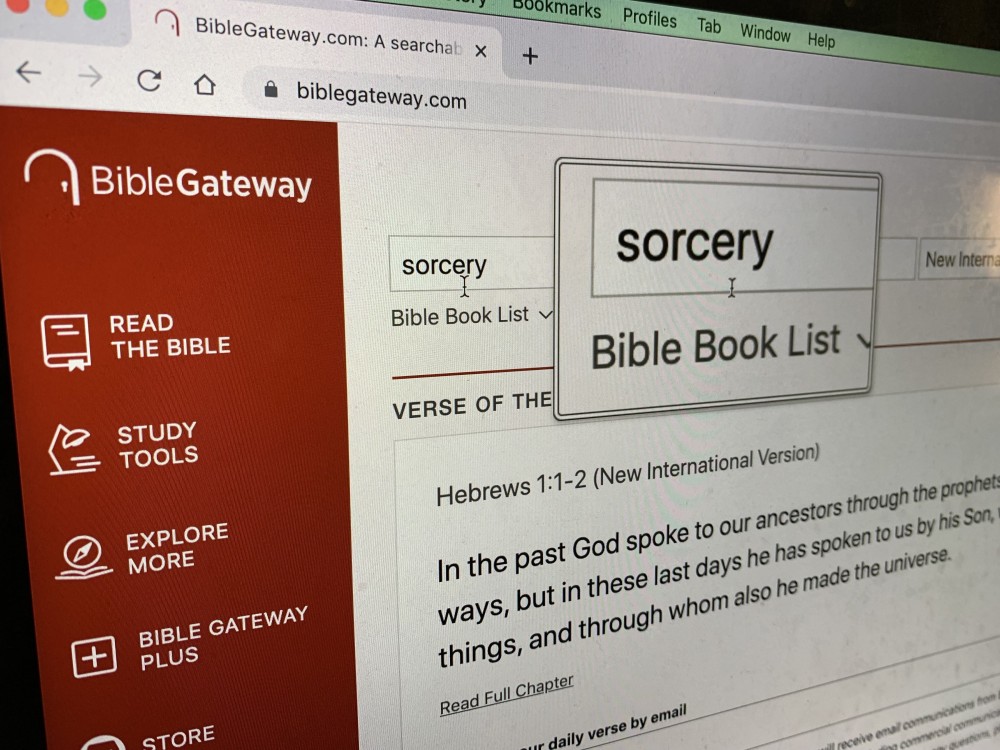Why ‘sorcery’ was the fastest-growing biblical search term in 2021

The topics people search for each year on Bible Gateway are always interesting, according to Jonathan Petersen, content manager of the website.
But 2021’s may be the “most intriguing,” Petersen wrote on the site.
Searches for the words sorcery and sorceries saw the biggest spike, increasing 193 percent over the last year on Bible Gateway, which allows users to read and search the text of multiple translations of the Bible.
And that doesn’t appear to be because witchcraft is increasingly becoming mainstream, even trendy.
Rather, Petersen wrote, curiosity over what the Bible has to say about sorcery is related to heightened interest in the Greek word pharmakeia. He pointed to its definition in the Mounce Concise Greek-English Dictionary of the New Testament: “employment of drugs for any purpose; sorcery, magic, enchantment.”
Pharmakeia appears in Galatians 5:19–21, a list of “acts of the flesh.” It also appears in Revelation 18:23: “By your magic spell all the nations were led astray.”
More recently, the word has appeared in debates over COVID-19 prevention measures, particularly opposition by some charismatic and evangelical Christians to vaccines against the disease.
Perhaps most prominently, Sherri Tenpenny—an osteopathic doctor and longtime anti-vaccine activist who appears on the Center for Countering Digital Hate’s “Disinformation Dozen” list—used the term during her Instagram Bible study called Happy Hour with Dr. T.
Read our latest issue or browse back issues.
In a March 25 video, Tenpenny took aim at pastors, priests, and rabbis who closed their houses of worship during the height of the COVID-19 pandemic and later opened them as vaccination centers, “pleasing the pharmakeia, the sorcerers, no doubt,” she said.
In an April 8 video, she again mentioned church leaders opening their sanctuaries to “sorcerers” to administer COVID-19 vaccines, which she believes are “experimental genetic modification tools” that will “permanently mark” recipients.
“What about Jesus healing the sick with his hands and with prayer? Our Lord would have never turned to the pharmakeia, the sorcerers, overlooking his father’s results,” Tenpenny said.
Christian singer and former American Idol contestant Danny Gokey also referenced pharmakeia in a series of tweets earlier this week linking COVID-19 vaccines to the “mark of the beast” mentioned in the book of Revelation.
“Revelations [sic] also emphasizes how the whole world will be deceived by Pharmakeia,” Gokey tweeted.
The word has come up in blog posts, podcasts, and on Amazon, where it has appeared on T-shirts (alongside search terms “vax Mandate Tyrants lockdowns”) and self-published books dating back to 2018 claiming to unmask a spirit of pharmakeia controlling the pharmaceutical industry worldwide.
It’s not unusual for people to search the Bible online to see what it has to say about major events in news and pop culture, according to Petersen at Bible Gateway.
“It seems topics that dominate the news media and social posts cause people to wonder what the Bible might have to say about them, so they search keywords and phrases on Bible Gateway to see what they can find,” he said.
For example, Petersen said, searches for Luke 10:18—“I saw Satan fall like lightning from heaven”—jumped in 2021 when the verse appeared on rapper Lil Nas X’s “Satan Shoes.”
In 2020, Bible Gateway saw a spike in searches for terms such as racism, justice, equality, and oppression after the murder of George Floyd and the protests that followed. The site also noted a surge in searches for what the Bible has to say about such topics such as disease, pestilence, and plague around the emergence of COVID-19 lockdowns and for politics-related terms in the lead-up to the presidential election.
The site’s most-read verses have remained the same for years: John 3:16 (“For God so loved the world”) and Jeremiah 29:11 (“I know the plans I have for you”).
Its top two most-searched terms have also remained unchanged: love and peace. —Religion News Service






